Analysis of the Travel and Tourism Sector: TUI Group Report
VerifiedAdded on 2020/06/06
|13
|3652
|122
Report
AI Summary
This report examines the travel and tourism sector, focusing on the TUI Group as a case study. It begins with an introduction to tourism and travel, followed by an analysis of historical developments and the structure of the sector, including hospitality, tour operations, travel agents, ancillary services, and transportation. The report then delves into the functions of government and international agencies, the influence of economic and political factors, and the implications of political changes on the sector. It explores factors affecting tourism demand (political, economic, and social) and how supply has adapted to meet this demand, including travel and transport, recreational activities, and accommodation. Finally, the report discusses the positive and negative economic, environmental, and social impacts of tourism and strategies to mitigate the negative impacts and maximize the positive ones. The report concludes by summarizing the key findings and providing references.
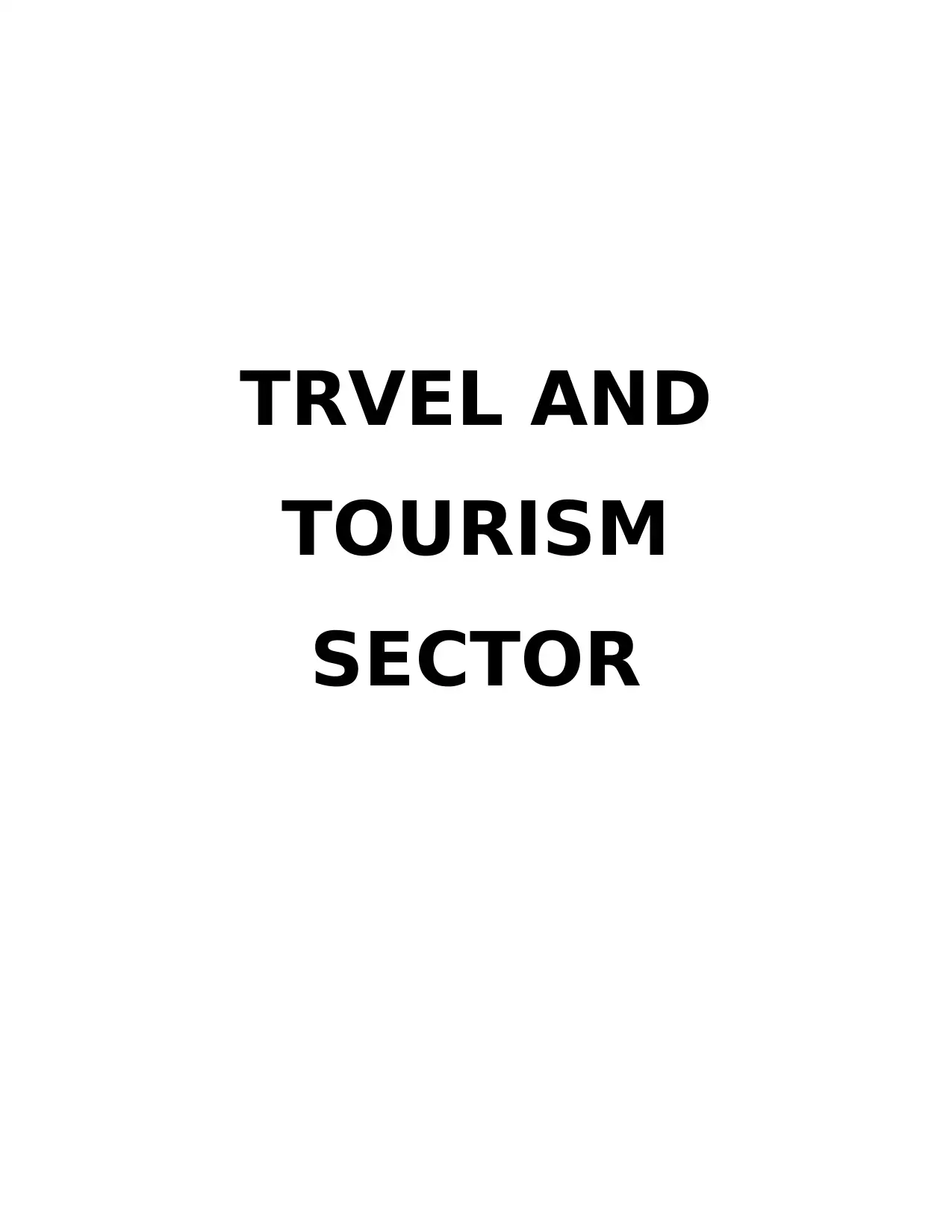
TRVEL AND
TOURISM
SECTOR
TOURISM
SECTOR
Paraphrase This Document
Need a fresh take? Get an instant paraphrase of this document with our AI Paraphraser
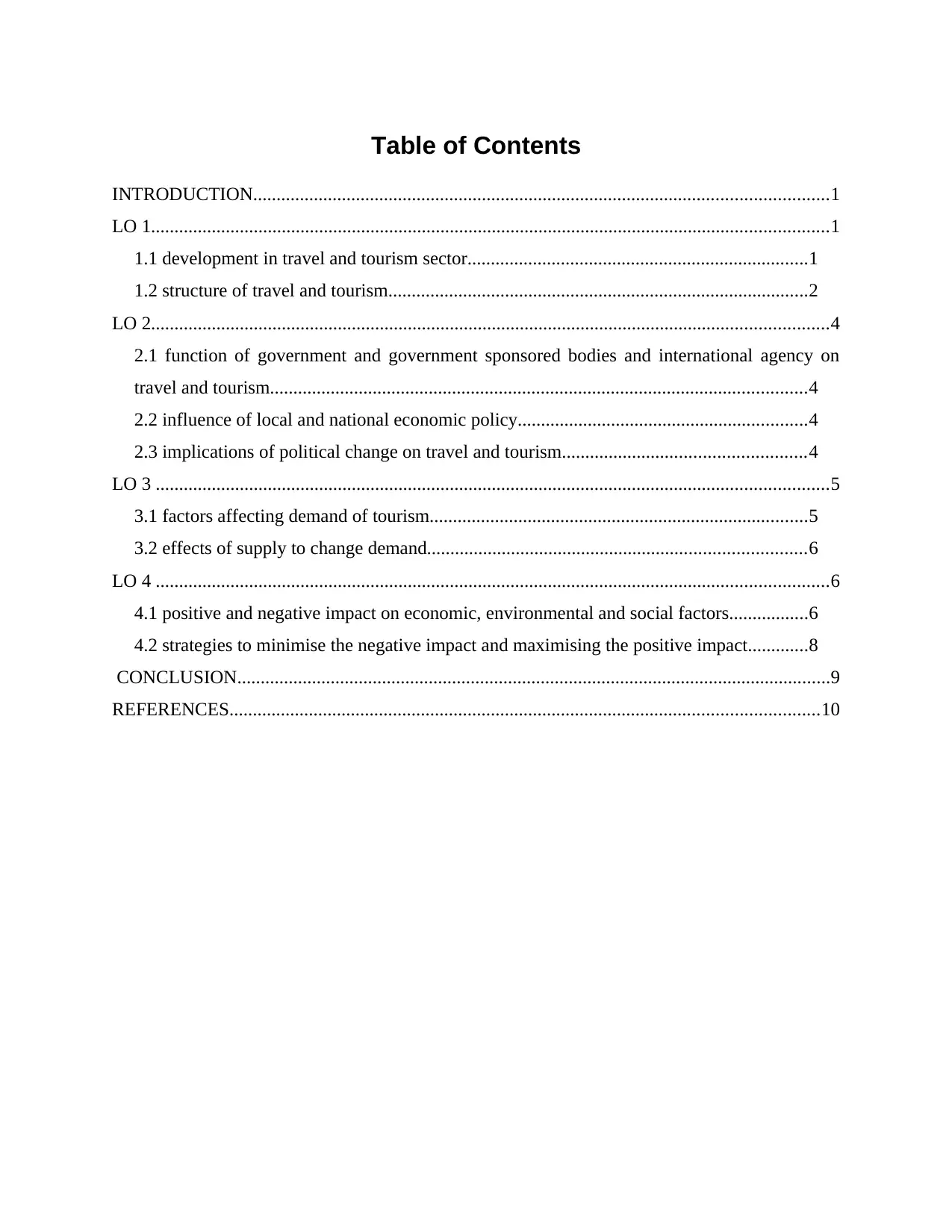
Table of Contents
INTRODUCTION...........................................................................................................................1
LO 1.................................................................................................................................................1
1.1 development in travel and tourism sector.........................................................................1
1.2 structure of travel and tourism..........................................................................................2
LO 2.................................................................................................................................................4
2.1 function of government and government sponsored bodies and international agency on
travel and tourism...................................................................................................................4
2.2 influence of local and national economic policy..............................................................4
2.3 implications of political change on travel and tourism....................................................4
LO 3 ................................................................................................................................................5
3.1 factors affecting demand of tourism.................................................................................5
3.2 effects of supply to change demand.................................................................................6
LO 4 ................................................................................................................................................6
4.1 positive and negative impact on economic, environmental and social factors.................6
4.2 strategies to minimise the negative impact and maximising the positive impact.............8
CONCLUSION...............................................................................................................................9
REFERENCES..............................................................................................................................10
INTRODUCTION...........................................................................................................................1
LO 1.................................................................................................................................................1
1.1 development in travel and tourism sector.........................................................................1
1.2 structure of travel and tourism..........................................................................................2
LO 2.................................................................................................................................................4
2.1 function of government and government sponsored bodies and international agency on
travel and tourism...................................................................................................................4
2.2 influence of local and national economic policy..............................................................4
2.3 implications of political change on travel and tourism....................................................4
LO 3 ................................................................................................................................................5
3.1 factors affecting demand of tourism.................................................................................5
3.2 effects of supply to change demand.................................................................................6
LO 4 ................................................................................................................................................6
4.1 positive and negative impact on economic, environmental and social factors.................6
4.2 strategies to minimise the negative impact and maximising the positive impact.............8
CONCLUSION...............................................................................................................................9
REFERENCES..............................................................................................................................10
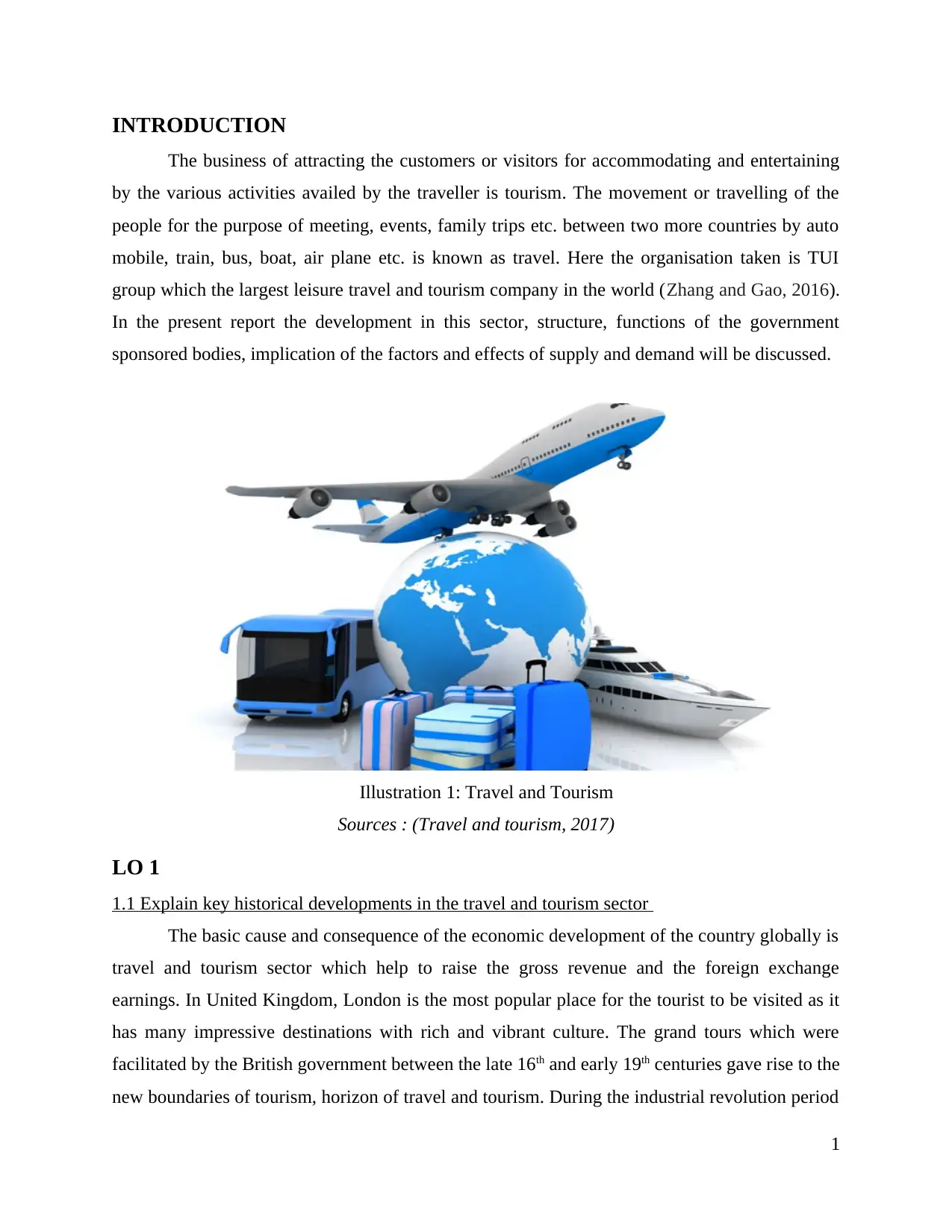
INTRODUCTION
The business of attracting the customers or visitors for accommodating and entertaining
by the various activities availed by the traveller is tourism. The movement or travelling of the
people for the purpose of meeting, events, family trips etc. between two more countries by auto
mobile, train, bus, boat, air plane etc. is known as travel. Here the organisation taken is TUI
group which the largest leisure travel and tourism company in the world (Zhang and Gao, 2016).
In the present report the development in this sector, structure, functions of the government
sponsored bodies, implication of the factors and effects of supply and demand will be discussed.
Sources : (Travel and tourism, 2017)
LO 1
1.1 Explain key historical developments in the travel and tourism sector
The basic cause and consequence of the economic development of the country globally is
travel and tourism sector which help to raise the gross revenue and the foreign exchange
earnings. In United Kingdom, London is the most popular place for the tourist to be visited as it
has many impressive destinations with rich and vibrant culture. The grand tours which were
facilitated by the British government between the late 16th and early 19th centuries gave rise to the
new boundaries of tourism, horizon of travel and tourism. During the industrial revolution period
1
Illustration 1: Travel and Tourism
The business of attracting the customers or visitors for accommodating and entertaining
by the various activities availed by the traveller is tourism. The movement or travelling of the
people for the purpose of meeting, events, family trips etc. between two more countries by auto
mobile, train, bus, boat, air plane etc. is known as travel. Here the organisation taken is TUI
group which the largest leisure travel and tourism company in the world (Zhang and Gao, 2016).
In the present report the development in this sector, structure, functions of the government
sponsored bodies, implication of the factors and effects of supply and demand will be discussed.
Sources : (Travel and tourism, 2017)
LO 1
1.1 Explain key historical developments in the travel and tourism sector
The basic cause and consequence of the economic development of the country globally is
travel and tourism sector which help to raise the gross revenue and the foreign exchange
earnings. In United Kingdom, London is the most popular place for the tourist to be visited as it
has many impressive destinations with rich and vibrant culture. The grand tours which were
facilitated by the British government between the late 16th and early 19th centuries gave rise to the
new boundaries of tourism, horizon of travel and tourism. During the industrial revolution period
1
Illustration 1: Travel and Tourism
⊘ This is a preview!⊘
Do you want full access?
Subscribe today to unlock all pages.

Trusted by 1+ million students worldwide
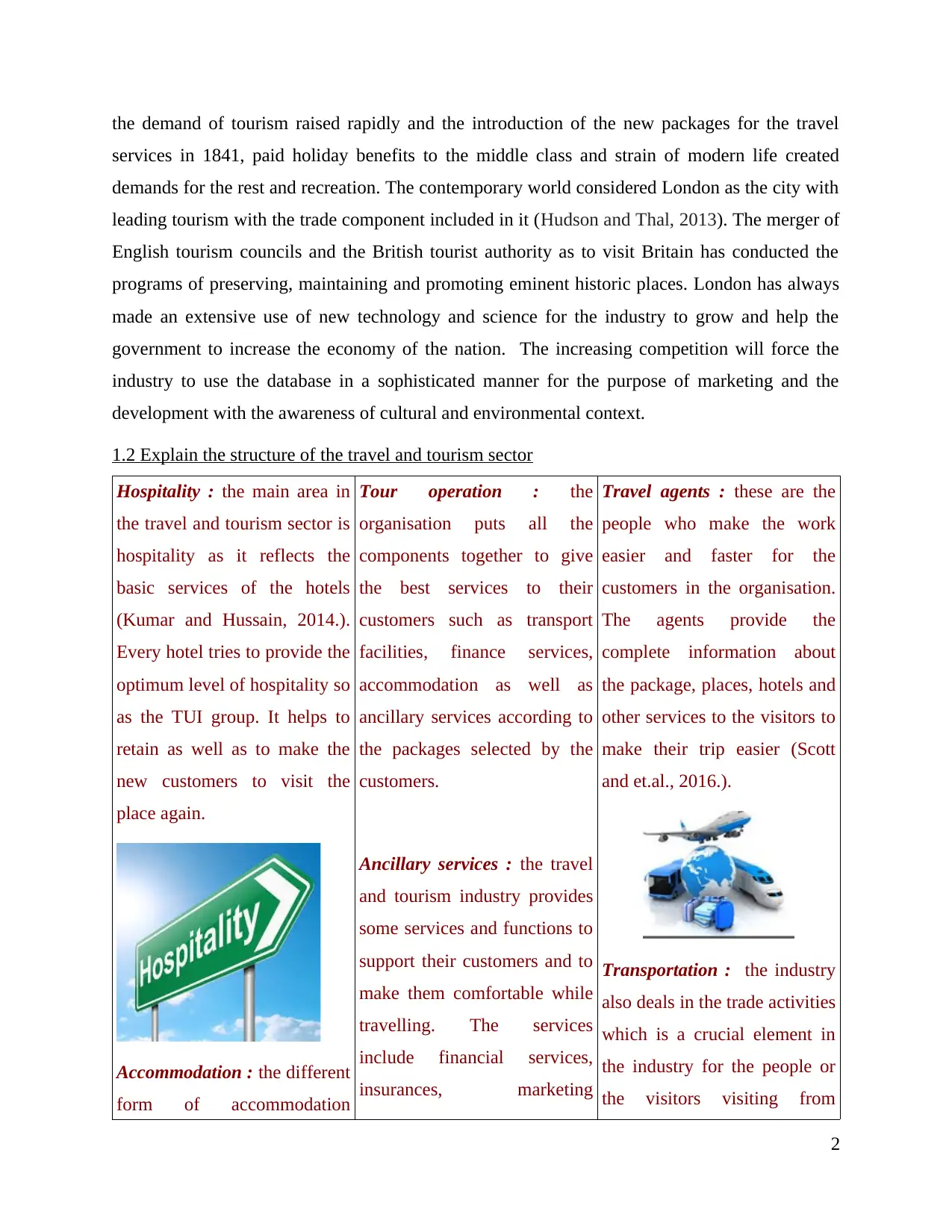
the demand of tourism raised rapidly and the introduction of the new packages for the travel
services in 1841, paid holiday benefits to the middle class and strain of modern life created
demands for the rest and recreation. The contemporary world considered London as the city with
leading tourism with the trade component included in it (Hudson and Thal, 2013). The merger of
English tourism councils and the British tourist authority as to visit Britain has conducted the
programs of preserving, maintaining and promoting eminent historic places. London has always
made an extensive use of new technology and science for the industry to grow and help the
government to increase the economy of the nation. The increasing competition will force the
industry to use the database in a sophisticated manner for the purpose of marketing and the
development with the awareness of cultural and environmental context.
1.2 Explain the structure of the travel and tourism sector
Hospitality : the main area in
the travel and tourism sector is
hospitality as it reflects the
basic services of the hotels
(Kumar and Hussain, 2014.).
Every hotel tries to provide the
optimum level of hospitality so
as the TUI group. It helps to
retain as well as to make the
new customers to visit the
place again.
Accommodation : the different
form of accommodation
Tour operation : the
organisation puts all the
components together to give
the best services to their
customers such as transport
facilities, finance services,
accommodation as well as
ancillary services according to
the packages selected by the
customers.
Ancillary services : the travel
and tourism industry provides
some services and functions to
support their customers and to
make them comfortable while
travelling. The services
include financial services,
insurances, marketing
Travel agents : these are the
people who make the work
easier and faster for the
customers in the organisation.
The agents provide the
complete information about
the package, places, hotels and
other services to the visitors to
make their trip easier (Scott
and et.al., 2016.).
Transportation : the industry
also deals in the trade activities
which is a crucial element in
the industry for the people or
the visitors visiting from
2
services in 1841, paid holiday benefits to the middle class and strain of modern life created
demands for the rest and recreation. The contemporary world considered London as the city with
leading tourism with the trade component included in it (Hudson and Thal, 2013). The merger of
English tourism councils and the British tourist authority as to visit Britain has conducted the
programs of preserving, maintaining and promoting eminent historic places. London has always
made an extensive use of new technology and science for the industry to grow and help the
government to increase the economy of the nation. The increasing competition will force the
industry to use the database in a sophisticated manner for the purpose of marketing and the
development with the awareness of cultural and environmental context.
1.2 Explain the structure of the travel and tourism sector
Hospitality : the main area in
the travel and tourism sector is
hospitality as it reflects the
basic services of the hotels
(Kumar and Hussain, 2014.).
Every hotel tries to provide the
optimum level of hospitality so
as the TUI group. It helps to
retain as well as to make the
new customers to visit the
place again.
Accommodation : the different
form of accommodation
Tour operation : the
organisation puts all the
components together to give
the best services to their
customers such as transport
facilities, finance services,
accommodation as well as
ancillary services according to
the packages selected by the
customers.
Ancillary services : the travel
and tourism industry provides
some services and functions to
support their customers and to
make them comfortable while
travelling. The services
include financial services,
insurances, marketing
Travel agents : these are the
people who make the work
easier and faster for the
customers in the organisation.
The agents provide the
complete information about
the package, places, hotels and
other services to the visitors to
make their trip easier (Scott
and et.al., 2016.).
Transportation : the industry
also deals in the trade activities
which is a crucial element in
the industry for the people or
the visitors visiting from
2
Paraphrase This Document
Need a fresh take? Get an instant paraphrase of this document with our AI Paraphraser
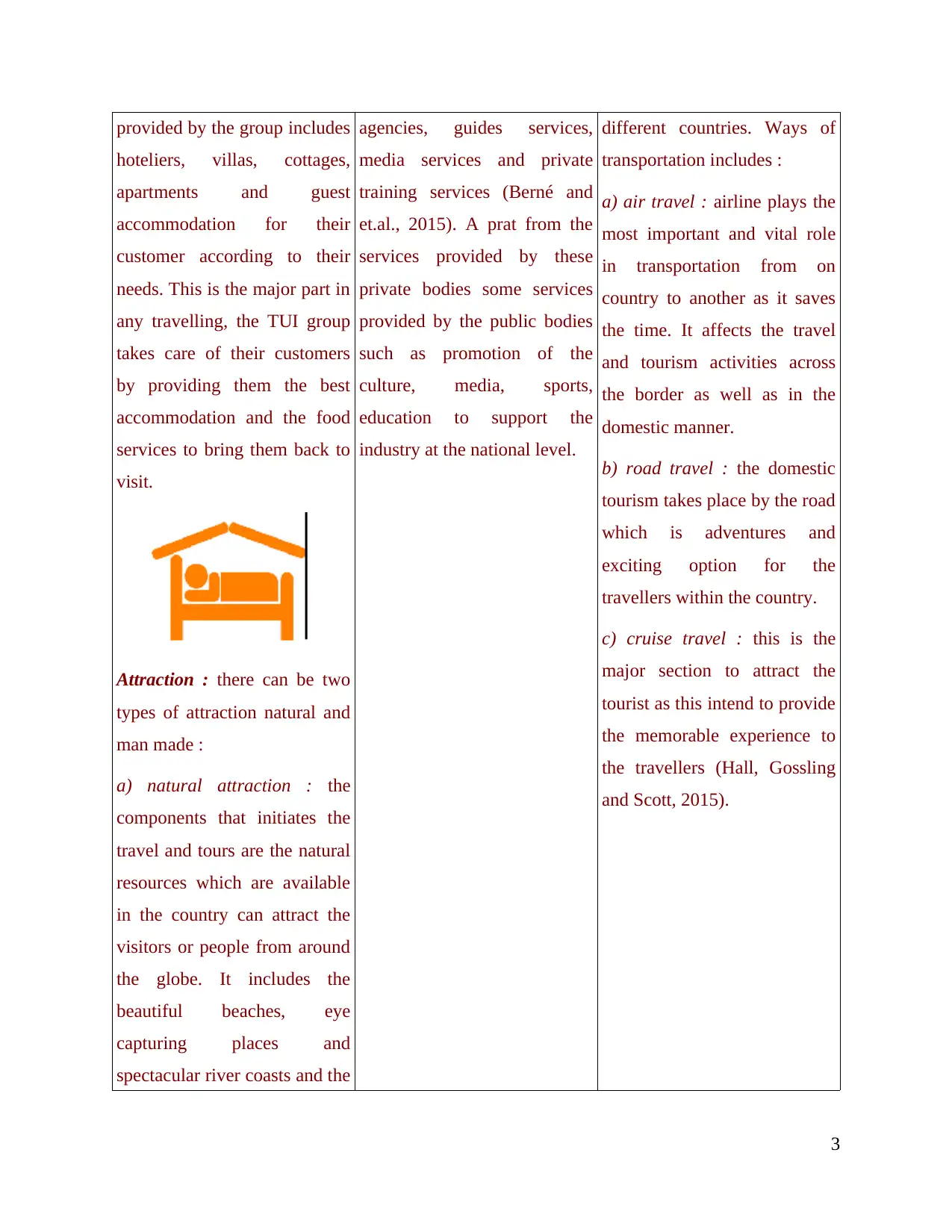
provided by the group includes
hoteliers, villas, cottages,
apartments and guest
accommodation for their
customer according to their
needs. This is the major part in
any travelling, the TUI group
takes care of their customers
by providing them the best
accommodation and the food
services to bring them back to
visit.
Attraction : there can be two
types of attraction natural and
man made :
a) natural attraction : the
components that initiates the
travel and tours are the natural
resources which are available
in the country can attract the
visitors or people from around
the globe. It includes the
beautiful beaches, eye
capturing places and
spectacular river coasts and the
agencies, guides services,
media services and private
training services (Berné and
et.al., 2015). A prat from the
services provided by these
private bodies some services
provided by the public bodies
such as promotion of the
culture, media, sports,
education to support the
industry at the national level.
different countries. Ways of
transportation includes :
a) air travel : airline plays the
most important and vital role
in transportation from on
country to another as it saves
the time. It affects the travel
and tourism activities across
the border as well as in the
domestic manner.
b) road travel : the domestic
tourism takes place by the road
which is adventures and
exciting option for the
travellers within the country.
c) cruise travel : this is the
major section to attract the
tourist as this intend to provide
the memorable experience to
the travellers (Hall, Gossling
and Scott, 2015).
3
hoteliers, villas, cottages,
apartments and guest
accommodation for their
customer according to their
needs. This is the major part in
any travelling, the TUI group
takes care of their customers
by providing them the best
accommodation and the food
services to bring them back to
visit.
Attraction : there can be two
types of attraction natural and
man made :
a) natural attraction : the
components that initiates the
travel and tours are the natural
resources which are available
in the country can attract the
visitors or people from around
the globe. It includes the
beautiful beaches, eye
capturing places and
spectacular river coasts and the
agencies, guides services,
media services and private
training services (Berné and
et.al., 2015). A prat from the
services provided by these
private bodies some services
provided by the public bodies
such as promotion of the
culture, media, sports,
education to support the
industry at the national level.
different countries. Ways of
transportation includes :
a) air travel : airline plays the
most important and vital role
in transportation from on
country to another as it saves
the time. It affects the travel
and tourism activities across
the border as well as in the
domestic manner.
b) road travel : the domestic
tourism takes place by the road
which is adventures and
exciting option for the
travellers within the country.
c) cruise travel : this is the
major section to attract the
tourist as this intend to provide
the memorable experience to
the travellers (Hall, Gossling
and Scott, 2015).
3
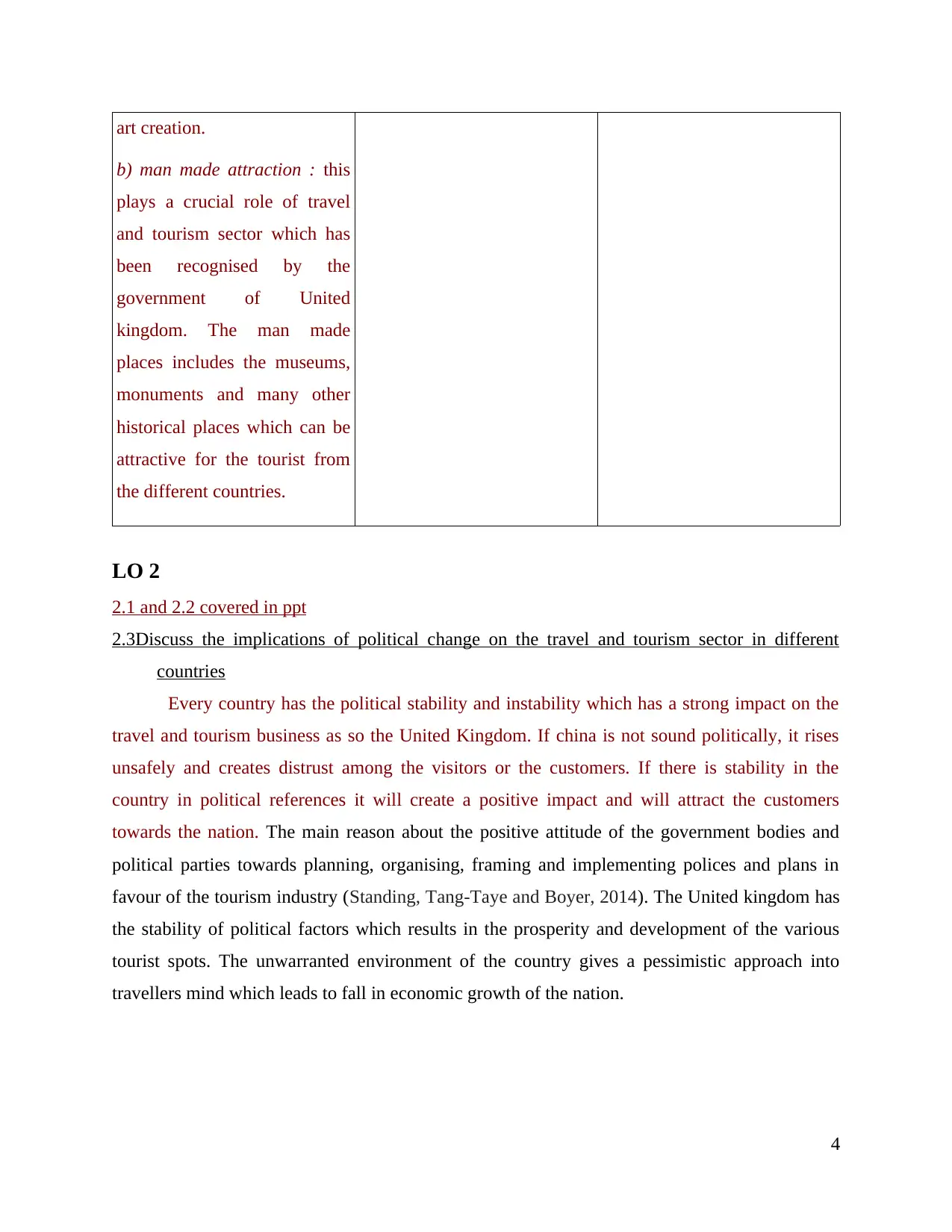
art creation.
b) man made attraction : this
plays a crucial role of travel
and tourism sector which has
been recognised by the
government of United
kingdom. The man made
places includes the museums,
monuments and many other
historical places which can be
attractive for the tourist from
the different countries.
LO 2
2.1 and 2.2 covered in ppt
2.3Discuss the implications of political change on the travel and tourism sector in different
countries
Every country has the political stability and instability which has a strong impact on the
travel and tourism business as so the United Kingdom. If china is not sound politically, it rises
unsafely and creates distrust among the visitors or the customers. If there is stability in the
country in political references it will create a positive impact and will attract the customers
towards the nation. The main reason about the positive attitude of the government bodies and
political parties towards planning, organising, framing and implementing polices and plans in
favour of the tourism industry (Standing, Tang-Taye and Boyer, 2014). The United kingdom has
the stability of political factors which results in the prosperity and development of the various
tourist spots. The unwarranted environment of the country gives a pessimistic approach into
travellers mind which leads to fall in economic growth of the nation.
4
b) man made attraction : this
plays a crucial role of travel
and tourism sector which has
been recognised by the
government of United
kingdom. The man made
places includes the museums,
monuments and many other
historical places which can be
attractive for the tourist from
the different countries.
LO 2
2.1 and 2.2 covered in ppt
2.3Discuss the implications of political change on the travel and tourism sector in different
countries
Every country has the political stability and instability which has a strong impact on the
travel and tourism business as so the United Kingdom. If china is not sound politically, it rises
unsafely and creates distrust among the visitors or the customers. If there is stability in the
country in political references it will create a positive impact and will attract the customers
towards the nation. The main reason about the positive attitude of the government bodies and
political parties towards planning, organising, framing and implementing polices and plans in
favour of the tourism industry (Standing, Tang-Taye and Boyer, 2014). The United kingdom has
the stability of political factors which results in the prosperity and development of the various
tourist spots. The unwarranted environment of the country gives a pessimistic approach into
travellers mind which leads to fall in economic growth of the nation.
4
⊘ This is a preview!⊘
Do you want full access?
Subscribe today to unlock all pages.

Trusted by 1+ million students worldwide
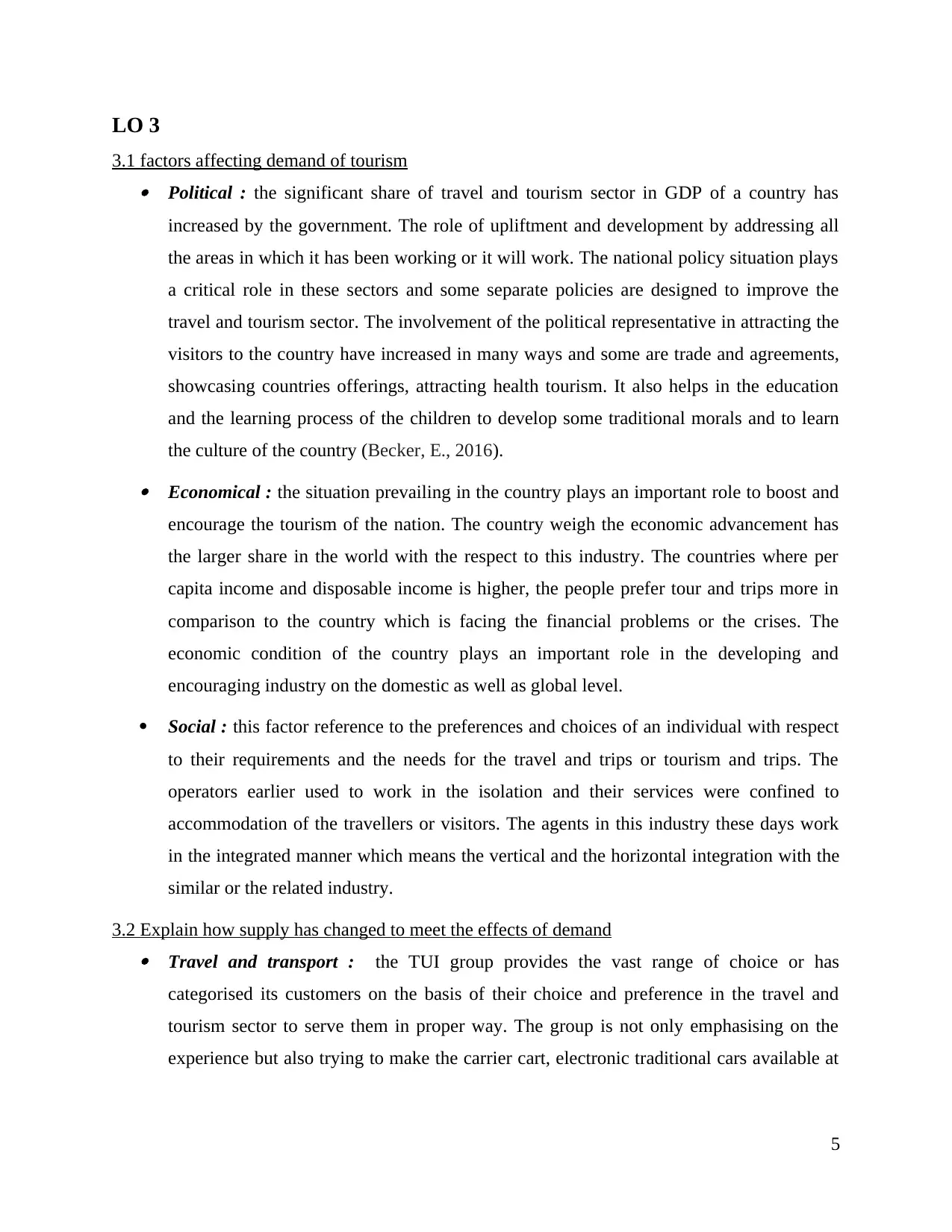
LO 3
3.1 factors affecting demand of tourism Political : the significant share of travel and tourism sector in GDP of a country has
increased by the government. The role of upliftment and development by addressing all
the areas in which it has been working or it will work. The national policy situation plays
a critical role in these sectors and some separate policies are designed to improve the
travel and tourism sector. The involvement of the political representative in attracting the
visitors to the country have increased in many ways and some are trade and agreements,
showcasing countries offerings, attracting health tourism. It also helps in the education
and the learning process of the children to develop some traditional morals and to learn
the culture of the country (Becker, E., 2016). Economical : the situation prevailing in the country plays an important role to boost and
encourage the tourism of the nation. The country weigh the economic advancement has
the larger share in the world with the respect to this industry. The countries where per
capita income and disposable income is higher, the people prefer tour and trips more in
comparison to the country which is facing the financial problems or the crises. The
economic condition of the country plays an important role in the developing and
encouraging industry on the domestic as well as global level.
Social : this factor reference to the preferences and choices of an individual with respect
to their requirements and the needs for the travel and trips or tourism and trips. The
operators earlier used to work in the isolation and their services were confined to
accommodation of the travellers or visitors. The agents in this industry these days work
in the integrated manner which means the vertical and the horizontal integration with the
similar or the related industry.
3.2 Explain how supply has changed to meet the effects of demand Travel and transport : the TUI group provides the vast range of choice or has
categorised its customers on the basis of their choice and preference in the travel and
tourism sector to serve them in proper way. The group is not only emphasising on the
experience but also trying to make the carrier cart, electronic traditional cars available at
5
3.1 factors affecting demand of tourism Political : the significant share of travel and tourism sector in GDP of a country has
increased by the government. The role of upliftment and development by addressing all
the areas in which it has been working or it will work. The national policy situation plays
a critical role in these sectors and some separate policies are designed to improve the
travel and tourism sector. The involvement of the political representative in attracting the
visitors to the country have increased in many ways and some are trade and agreements,
showcasing countries offerings, attracting health tourism. It also helps in the education
and the learning process of the children to develop some traditional morals and to learn
the culture of the country (Becker, E., 2016). Economical : the situation prevailing in the country plays an important role to boost and
encourage the tourism of the nation. The country weigh the economic advancement has
the larger share in the world with the respect to this industry. The countries where per
capita income and disposable income is higher, the people prefer tour and trips more in
comparison to the country which is facing the financial problems or the crises. The
economic condition of the country plays an important role in the developing and
encouraging industry on the domestic as well as global level.
Social : this factor reference to the preferences and choices of an individual with respect
to their requirements and the needs for the travel and trips or tourism and trips. The
operators earlier used to work in the isolation and their services were confined to
accommodation of the travellers or visitors. The agents in this industry these days work
in the integrated manner which means the vertical and the horizontal integration with the
similar or the related industry.
3.2 Explain how supply has changed to meet the effects of demand Travel and transport : the TUI group provides the vast range of choice or has
categorised its customers on the basis of their choice and preference in the travel and
tourism sector to serve them in proper way. The group is not only emphasising on the
experience but also trying to make the carrier cart, electronic traditional cars available at
5
Paraphrase This Document
Need a fresh take? Get an instant paraphrase of this document with our AI Paraphraser
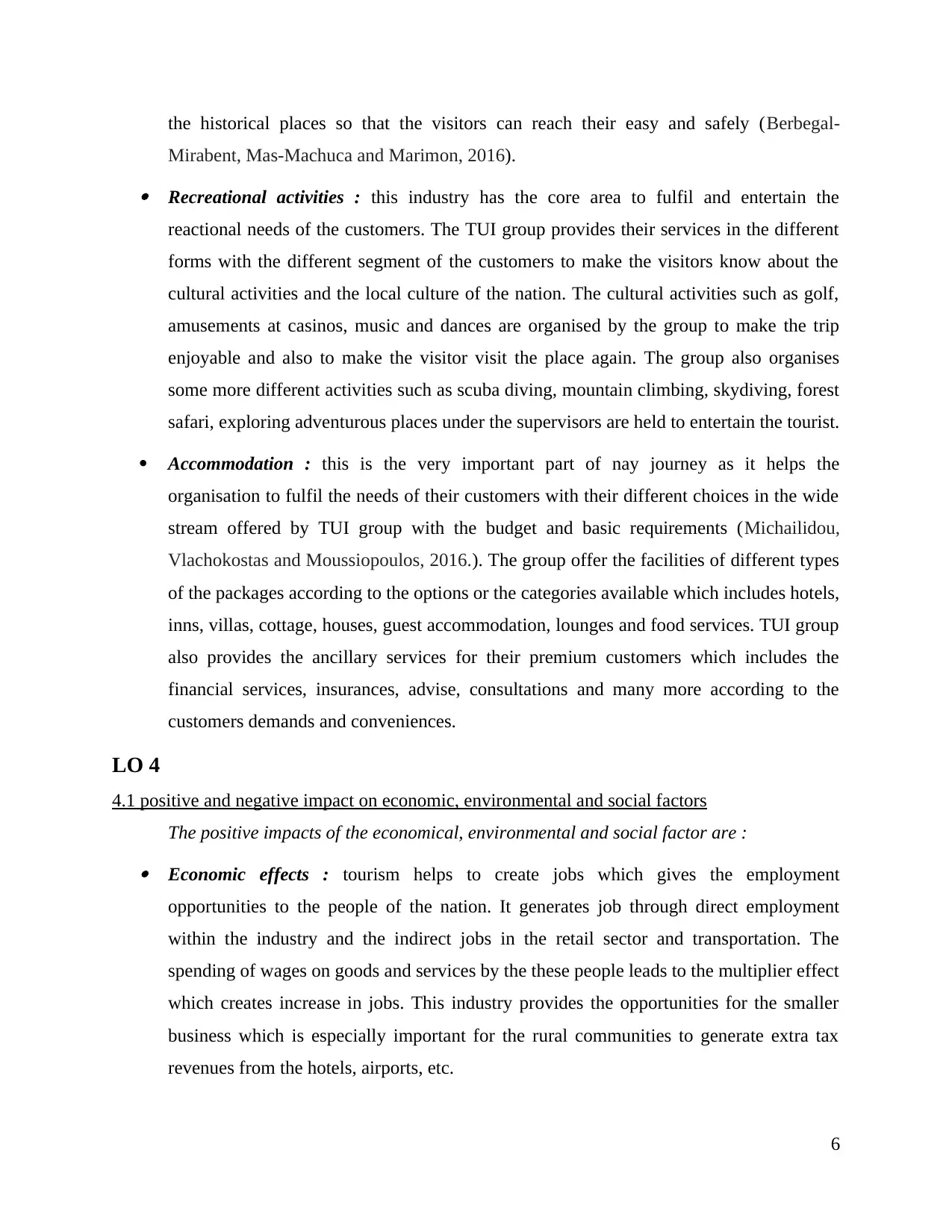
the historical places so that the visitors can reach their easy and safely (Berbegal-
Mirabent, Mas-Machuca and Marimon, 2016). Recreational activities : this industry has the core area to fulfil and entertain the
reactional needs of the customers. The TUI group provides their services in the different
forms with the different segment of the customers to make the visitors know about the
cultural activities and the local culture of the nation. The cultural activities such as golf,
amusements at casinos, music and dances are organised by the group to make the trip
enjoyable and also to make the visitor visit the place again. The group also organises
some more different activities such as scuba diving, mountain climbing, skydiving, forest
safari, exploring adventurous places under the supervisors are held to entertain the tourist.
Accommodation : this is the very important part of nay journey as it helps the
organisation to fulfil the needs of their customers with their different choices in the wide
stream offered by TUI group with the budget and basic requirements (Michailidou,
Vlachokostas and Moussiopoulos, 2016.). The group offer the facilities of different types
of the packages according to the options or the categories available which includes hotels,
inns, villas, cottage, houses, guest accommodation, lounges and food services. TUI group
also provides the ancillary services for their premium customers which includes the
financial services, insurances, advise, consultations and many more according to the
customers demands and conveniences.
LO 4
4.1 positive and negative impact on economic, environmental and social factors
The positive impacts of the economical, environmental and social factor are : Economic effects : tourism helps to create jobs which gives the employment
opportunities to the people of the nation. It generates job through direct employment
within the industry and the indirect jobs in the retail sector and transportation. The
spending of wages on goods and services by the these people leads to the multiplier effect
which creates increase in jobs. This industry provides the opportunities for the smaller
business which is especially important for the rural communities to generate extra tax
revenues from the hotels, airports, etc.
6
Mirabent, Mas-Machuca and Marimon, 2016). Recreational activities : this industry has the core area to fulfil and entertain the
reactional needs of the customers. The TUI group provides their services in the different
forms with the different segment of the customers to make the visitors know about the
cultural activities and the local culture of the nation. The cultural activities such as golf,
amusements at casinos, music and dances are organised by the group to make the trip
enjoyable and also to make the visitor visit the place again. The group also organises
some more different activities such as scuba diving, mountain climbing, skydiving, forest
safari, exploring adventurous places under the supervisors are held to entertain the tourist.
Accommodation : this is the very important part of nay journey as it helps the
organisation to fulfil the needs of their customers with their different choices in the wide
stream offered by TUI group with the budget and basic requirements (Michailidou,
Vlachokostas and Moussiopoulos, 2016.). The group offer the facilities of different types
of the packages according to the options or the categories available which includes hotels,
inns, villas, cottage, houses, guest accommodation, lounges and food services. TUI group
also provides the ancillary services for their premium customers which includes the
financial services, insurances, advise, consultations and many more according to the
customers demands and conveniences.
LO 4
4.1 positive and negative impact on economic, environmental and social factors
The positive impacts of the economical, environmental and social factor are : Economic effects : tourism helps to create jobs which gives the employment
opportunities to the people of the nation. It generates job through direct employment
within the industry and the indirect jobs in the retail sector and transportation. The
spending of wages on goods and services by the these people leads to the multiplier effect
which creates increase in jobs. This industry provides the opportunities for the smaller
business which is especially important for the rural communities to generate extra tax
revenues from the hotels, airports, etc.
6
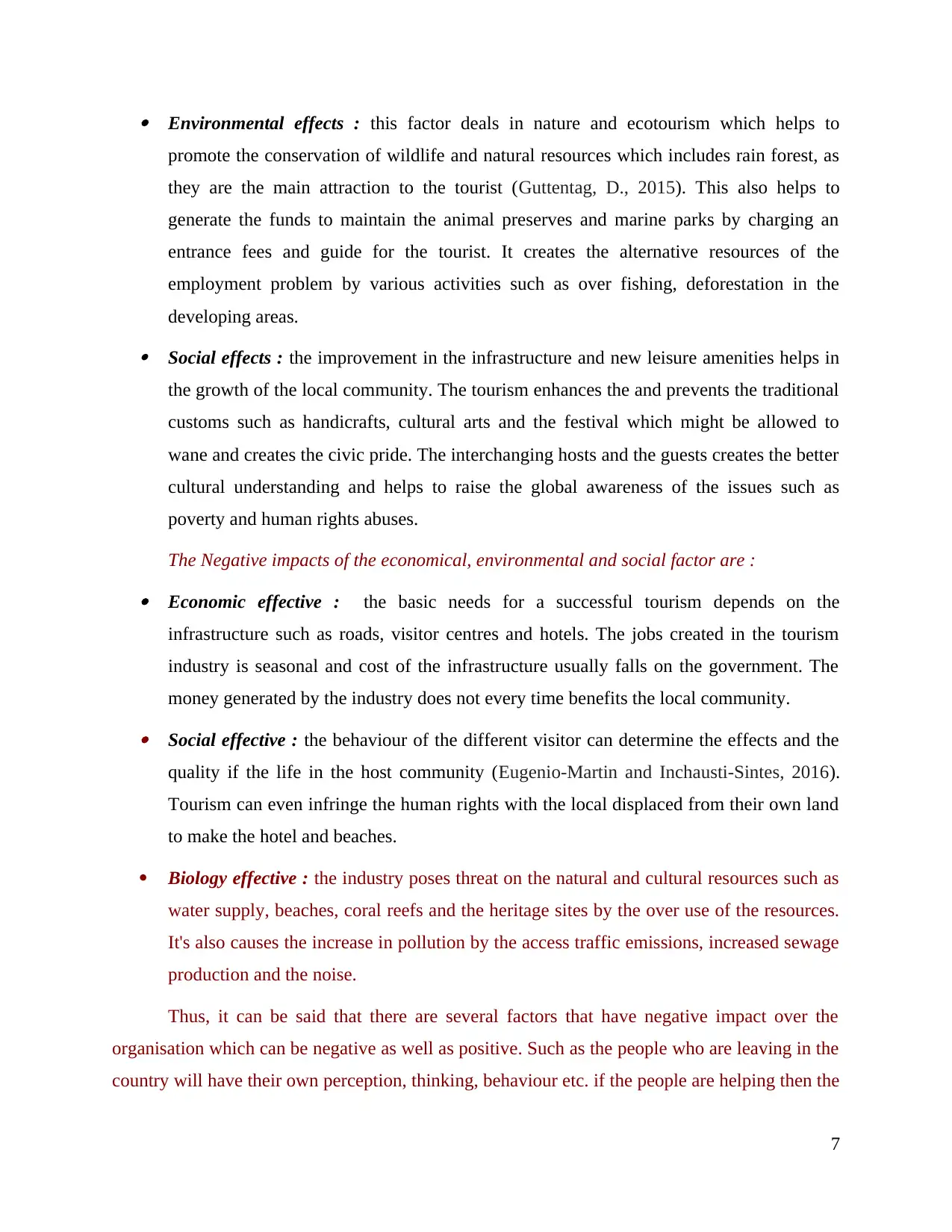
Environmental effects : this factor deals in nature and ecotourism which helps to
promote the conservation of wildlife and natural resources which includes rain forest, as
they are the main attraction to the tourist (Guttentag, D., 2015). This also helps to
generate the funds to maintain the animal preserves and marine parks by charging an
entrance fees and guide for the tourist. It creates the alternative resources of the
employment problem by various activities such as over fishing, deforestation in the
developing areas. Social effects : the improvement in the infrastructure and new leisure amenities helps in
the growth of the local community. The tourism enhances the and prevents the traditional
customs such as handicrafts, cultural arts and the festival which might be allowed to
wane and creates the civic pride. The interchanging hosts and the guests creates the better
cultural understanding and helps to raise the global awareness of the issues such as
poverty and human rights abuses.
The Negative impacts of the economical, environmental and social factor are : Economic effective : the basic needs for a successful tourism depends on the
infrastructure such as roads, visitor centres and hotels. The jobs created in the tourism
industry is seasonal and cost of the infrastructure usually falls on the government. The
money generated by the industry does not every time benefits the local community. Social effective : the behaviour of the different visitor can determine the effects and the
quality if the life in the host community (Eugenio-Martin and Inchausti-Sintes, 2016).
Tourism can even infringe the human rights with the local displaced from their own land
to make the hotel and beaches.
Biology effective : the industry poses threat on the natural and cultural resources such as
water supply, beaches, coral reefs and the heritage sites by the over use of the resources.
It's also causes the increase in pollution by the access traffic emissions, increased sewage
production and the noise.
Thus, it can be said that there are several factors that have negative impact over the
organisation which can be negative as well as positive. Such as the people who are leaving in the
country will have their own perception, thinking, behaviour etc. if the people are helping then the
7
promote the conservation of wildlife and natural resources which includes rain forest, as
they are the main attraction to the tourist (Guttentag, D., 2015). This also helps to
generate the funds to maintain the animal preserves and marine parks by charging an
entrance fees and guide for the tourist. It creates the alternative resources of the
employment problem by various activities such as over fishing, deforestation in the
developing areas. Social effects : the improvement in the infrastructure and new leisure amenities helps in
the growth of the local community. The tourism enhances the and prevents the traditional
customs such as handicrafts, cultural arts and the festival which might be allowed to
wane and creates the civic pride. The interchanging hosts and the guests creates the better
cultural understanding and helps to raise the global awareness of the issues such as
poverty and human rights abuses.
The Negative impacts of the economical, environmental and social factor are : Economic effective : the basic needs for a successful tourism depends on the
infrastructure such as roads, visitor centres and hotels. The jobs created in the tourism
industry is seasonal and cost of the infrastructure usually falls on the government. The
money generated by the industry does not every time benefits the local community. Social effective : the behaviour of the different visitor can determine the effects and the
quality if the life in the host community (Eugenio-Martin and Inchausti-Sintes, 2016).
Tourism can even infringe the human rights with the local displaced from their own land
to make the hotel and beaches.
Biology effective : the industry poses threat on the natural and cultural resources such as
water supply, beaches, coral reefs and the heritage sites by the over use of the resources.
It's also causes the increase in pollution by the access traffic emissions, increased sewage
production and the noise.
Thus, it can be said that there are several factors that have negative impact over the
organisation which can be negative as well as positive. Such as the people who are leaving in the
country will have their own perception, thinking, behaviour etc. if the people are helping then the
7
⊘ This is a preview!⊘
Do you want full access?
Subscribe today to unlock all pages.

Trusted by 1+ million students worldwide
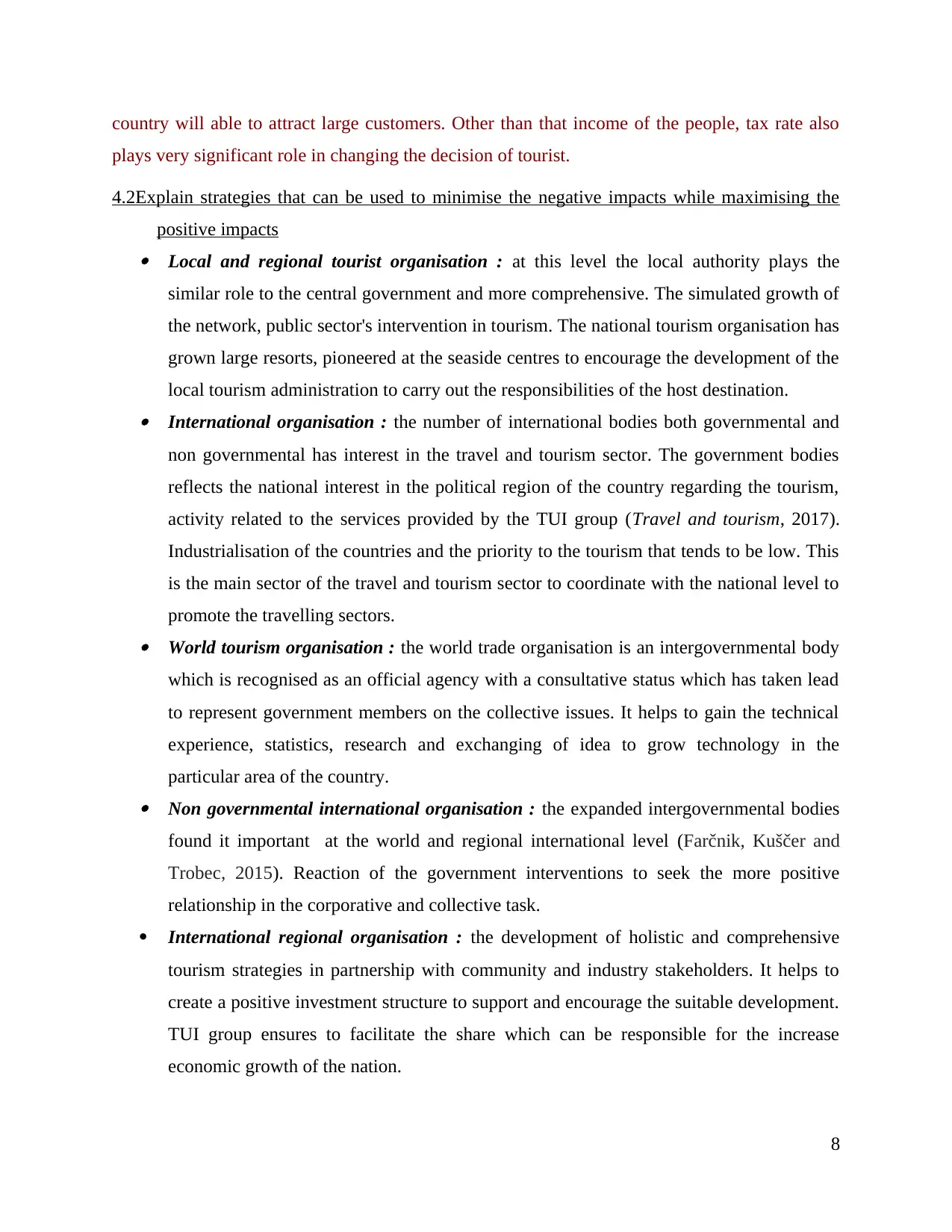
country will able to attract large customers. Other than that income of the people, tax rate also
plays very significant role in changing the decision of tourist.
4.2Explain strategies that can be used to minimise the negative impacts while maximising the
positive impacts Local and regional tourist organisation : at this level the local authority plays the
similar role to the central government and more comprehensive. The simulated growth of
the network, public sector's intervention in tourism. The national tourism organisation has
grown large resorts, pioneered at the seaside centres to encourage the development of the
local tourism administration to carry out the responsibilities of the host destination. International organisation : the number of international bodies both governmental and
non governmental has interest in the travel and tourism sector. The government bodies
reflects the national interest in the political region of the country regarding the tourism,
activity related to the services provided by the TUI group (Travel and tourism, 2017).
Industrialisation of the countries and the priority to the tourism that tends to be low. This
is the main sector of the travel and tourism sector to coordinate with the national level to
promote the travelling sectors. World tourism organisation : the world trade organisation is an intergovernmental body
which is recognised as an official agency with a consultative status which has taken lead
to represent government members on the collective issues. It helps to gain the technical
experience, statistics, research and exchanging of idea to grow technology in the
particular area of the country. Non governmental international organisation : the expanded intergovernmental bodies
found it important at the world and regional international level (Farčnik, Kuščer and
Trobec, 2015). Reaction of the government interventions to seek the more positive
relationship in the corporative and collective task.
International regional organisation : the development of holistic and comprehensive
tourism strategies in partnership with community and industry stakeholders. It helps to
create a positive investment structure to support and encourage the suitable development.
TUI group ensures to facilitate the share which can be responsible for the increase
economic growth of the nation.
8
plays very significant role in changing the decision of tourist.
4.2Explain strategies that can be used to minimise the negative impacts while maximising the
positive impacts Local and regional tourist organisation : at this level the local authority plays the
similar role to the central government and more comprehensive. The simulated growth of
the network, public sector's intervention in tourism. The national tourism organisation has
grown large resorts, pioneered at the seaside centres to encourage the development of the
local tourism administration to carry out the responsibilities of the host destination. International organisation : the number of international bodies both governmental and
non governmental has interest in the travel and tourism sector. The government bodies
reflects the national interest in the political region of the country regarding the tourism,
activity related to the services provided by the TUI group (Travel and tourism, 2017).
Industrialisation of the countries and the priority to the tourism that tends to be low. This
is the main sector of the travel and tourism sector to coordinate with the national level to
promote the travelling sectors. World tourism organisation : the world trade organisation is an intergovernmental body
which is recognised as an official agency with a consultative status which has taken lead
to represent government members on the collective issues. It helps to gain the technical
experience, statistics, research and exchanging of idea to grow technology in the
particular area of the country. Non governmental international organisation : the expanded intergovernmental bodies
found it important at the world and regional international level (Farčnik, Kuščer and
Trobec, 2015). Reaction of the government interventions to seek the more positive
relationship in the corporative and collective task.
International regional organisation : the development of holistic and comprehensive
tourism strategies in partnership with community and industry stakeholders. It helps to
create a positive investment structure to support and encourage the suitable development.
TUI group ensures to facilitate the share which can be responsible for the increase
economic growth of the nation.
8
Paraphrase This Document
Need a fresh take? Get an instant paraphrase of this document with our AI Paraphraser
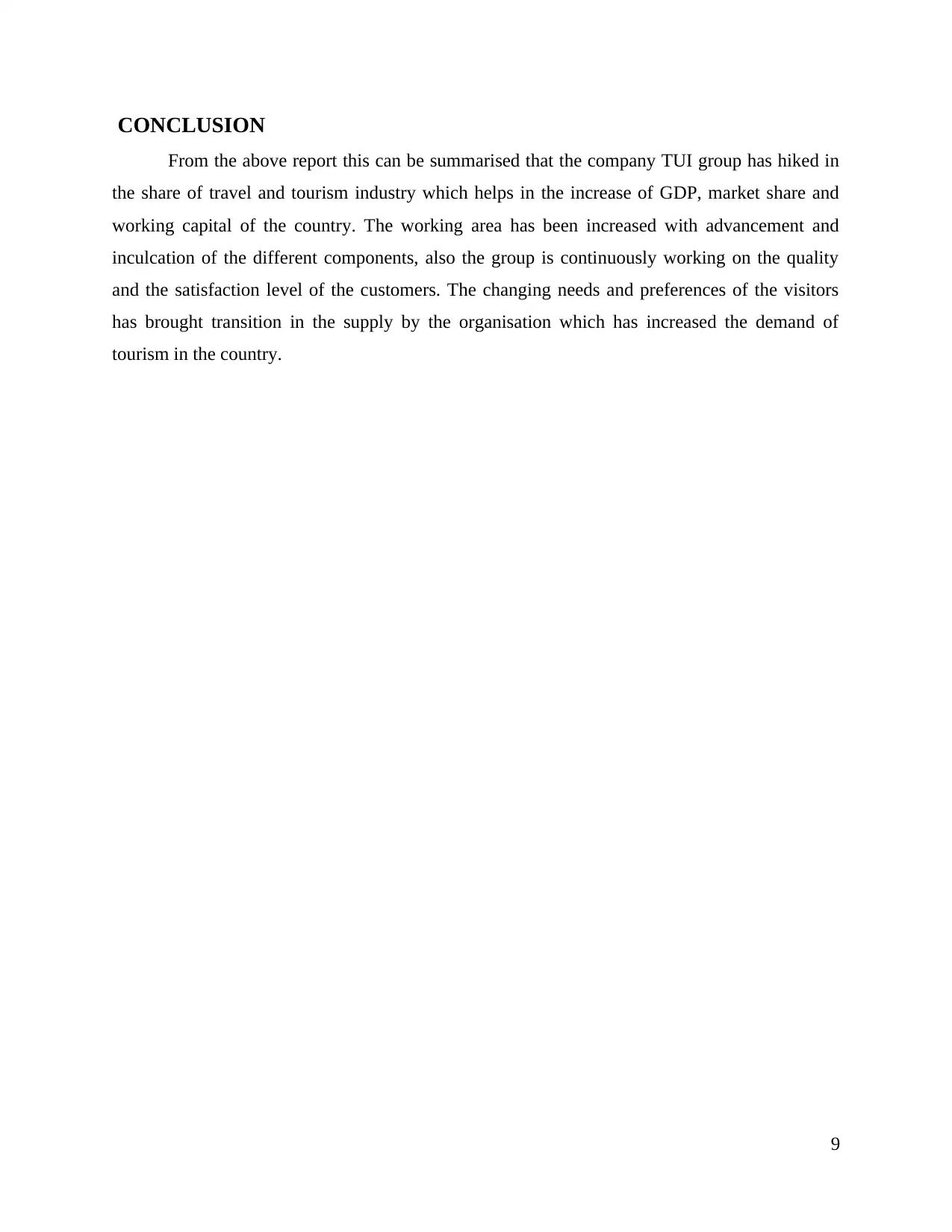
CONCLUSION
From the above report this can be summarised that the company TUI group has hiked in
the share of travel and tourism industry which helps in the increase of GDP, market share and
working capital of the country. The working area has been increased with advancement and
inculcation of the different components, also the group is continuously working on the quality
and the satisfaction level of the customers. The changing needs and preferences of the visitors
has brought transition in the supply by the organisation which has increased the demand of
tourism in the country.
9
From the above report this can be summarised that the company TUI group has hiked in
the share of travel and tourism industry which helps in the increase of GDP, market share and
working capital of the country. The working area has been increased with advancement and
inculcation of the different components, also the group is continuously working on the quality
and the satisfaction level of the customers. The changing needs and preferences of the visitors
has brought transition in the supply by the organisation which has increased the demand of
tourism in the country.
9
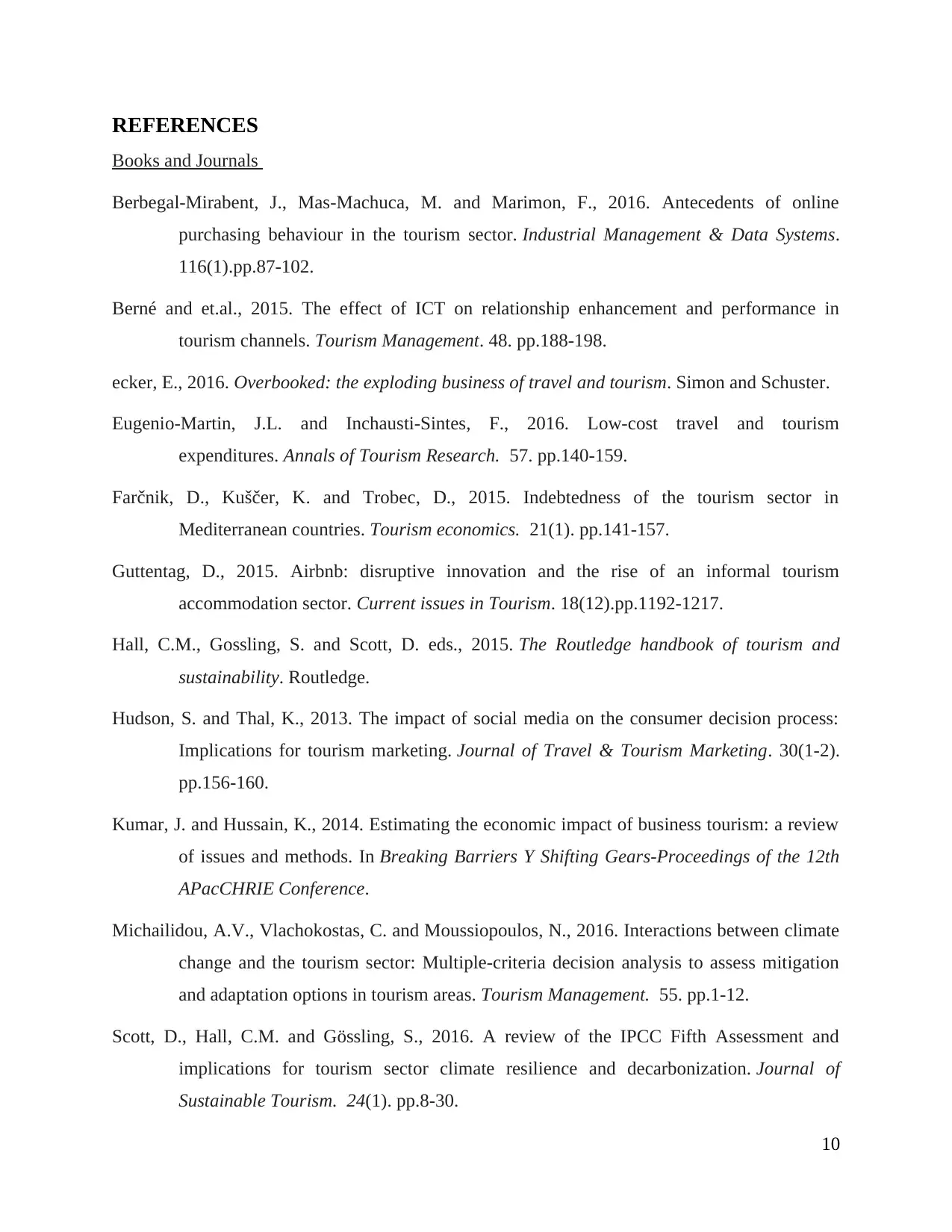
REFERENCES
Books and Journals
Berbegal-Mirabent, J., Mas-Machuca, M. and Marimon, F., 2016. Antecedents of online
purchasing behaviour in the tourism sector. Industrial Management & Data Systems.
116(1).pp.87-102.
Berné and et.al., 2015. The effect of ICT on relationship enhancement and performance in
tourism channels. Tourism Management. 48. pp.188-198.
ecker, E., 2016. Overbooked: the exploding business of travel and tourism. Simon and Schuster.
Eugenio-Martin, J.L. and Inchausti-Sintes, F., 2016. Low-cost travel and tourism
expenditures. Annals of Tourism Research. 57. pp.140-159.
Farčnik, D., Kuščer, K. and Trobec, D., 2015. Indebtedness of the tourism sector in
Mediterranean countries. Tourism economics. 21(1). pp.141-157.
Guttentag, D., 2015. Airbnb: disruptive innovation and the rise of an informal tourism
accommodation sector. Current issues in Tourism. 18(12).pp.1192-1217.
Hall, C.M., Gossling, S. and Scott, D. eds., 2015. The Routledge handbook of tourism and
sustainability. Routledge.
Hudson, S. and Thal, K., 2013. The impact of social media on the consumer decision process:
Implications for tourism marketing. Journal of Travel & Tourism Marketing. 30(1-2).
pp.156-160.
Kumar, J. and Hussain, K., 2014. Estimating the economic impact of business tourism: a review
of issues and methods. In Breaking Barriers Y Shifting Gears-Proceedings of the 12th
APacCHRIE Conference.
Michailidou, A.V., Vlachokostas, C. and Moussiopoulos, Ν., 2016. Interactions between climate
change and the tourism sector: Multiple-criteria decision analysis to assess mitigation
and adaptation options in tourism areas. Tourism Management. 55. pp.1-12.
Scott, D., Hall, C.M. and Gössling, S., 2016. A review of the IPCC Fifth Assessment and
implications for tourism sector climate resilience and decarbonization. Journal of
Sustainable Tourism. 24(1). pp.8-30.
10
Books and Journals
Berbegal-Mirabent, J., Mas-Machuca, M. and Marimon, F., 2016. Antecedents of online
purchasing behaviour in the tourism sector. Industrial Management & Data Systems.
116(1).pp.87-102.
Berné and et.al., 2015. The effect of ICT on relationship enhancement and performance in
tourism channels. Tourism Management. 48. pp.188-198.
ecker, E., 2016. Overbooked: the exploding business of travel and tourism. Simon and Schuster.
Eugenio-Martin, J.L. and Inchausti-Sintes, F., 2016. Low-cost travel and tourism
expenditures. Annals of Tourism Research. 57. pp.140-159.
Farčnik, D., Kuščer, K. and Trobec, D., 2015. Indebtedness of the tourism sector in
Mediterranean countries. Tourism economics. 21(1). pp.141-157.
Guttentag, D., 2015. Airbnb: disruptive innovation and the rise of an informal tourism
accommodation sector. Current issues in Tourism. 18(12).pp.1192-1217.
Hall, C.M., Gossling, S. and Scott, D. eds., 2015. The Routledge handbook of tourism and
sustainability. Routledge.
Hudson, S. and Thal, K., 2013. The impact of social media on the consumer decision process:
Implications for tourism marketing. Journal of Travel & Tourism Marketing. 30(1-2).
pp.156-160.
Kumar, J. and Hussain, K., 2014. Estimating the economic impact of business tourism: a review
of issues and methods. In Breaking Barriers Y Shifting Gears-Proceedings of the 12th
APacCHRIE Conference.
Michailidou, A.V., Vlachokostas, C. and Moussiopoulos, Ν., 2016. Interactions between climate
change and the tourism sector: Multiple-criteria decision analysis to assess mitigation
and adaptation options in tourism areas. Tourism Management. 55. pp.1-12.
Scott, D., Hall, C.M. and Gössling, S., 2016. A review of the IPCC Fifth Assessment and
implications for tourism sector climate resilience and decarbonization. Journal of
Sustainable Tourism. 24(1). pp.8-30.
10
⊘ This is a preview!⊘
Do you want full access?
Subscribe today to unlock all pages.

Trusted by 1+ million students worldwide
1 out of 13
Related Documents
Your All-in-One AI-Powered Toolkit for Academic Success.
+13062052269
info@desklib.com
Available 24*7 on WhatsApp / Email
![[object Object]](/_next/static/media/star-bottom.7253800d.svg)
Unlock your academic potential
Copyright © 2020–2025 A2Z Services. All Rights Reserved. Developed and managed by ZUCOL.





